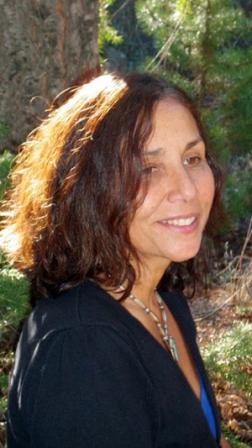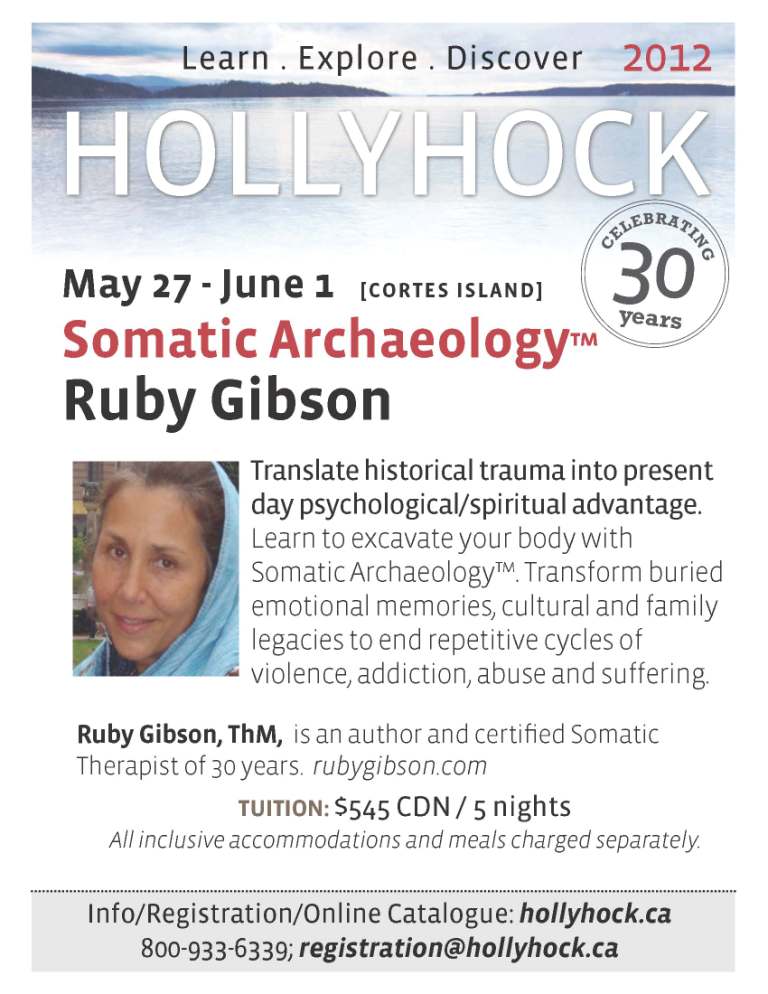In Vancouver, BC Tune in every Wednesday 6 – 7 PM to CFRO – 100.5 FM
Anywhere in the world by Stream, Satellite, TelusTv - How to Listen
Only last 10 shows are available to listen to for free - REGISTER NOW. Supporting Members have unlimited access to this and hundreds of other life changing programs - Click Here to sign-up
 Ruby Gibson’s passion for the past 30 years has been to develop an effective somatic system for transgenerational reconciliation. She is the developer and teacher of Somatic Archaeology and Generational Brainspotting and travels internationally sharing her work.
Ruby Gibson’s passion for the past 30 years has been to develop an effective somatic system for transgenerational reconciliation. She is the developer and teacher of Somatic Archaeology and Generational Brainspotting and travels internationally sharing her work.
A woman of mixed descent, Ruby carries lineage from both Mediterranean and Native American cultures allowing her to be a bridge between worlds.With a Master’s degree in Theology and Transformational Psychology, Ruby is currently a doctoral candidate researching the multicultural efficacy and benefits of intergenerational healing.
A certified somatic therapist, spiritual counselor and licensed massage therapist, Ruby has a thriving private practice based on client empowerment designed to end repetitive cycles. Ruby enjoys teaching people about honoring their bodies, adapting natural healing systems, expressing creative capacity, and developing self-love and authenticity.
Residing in the Rocky Mountains of Colorado, she is an earth-centered ceremonialist, aromatherapist, poet, and the author of two books most recently My Body, My Earth, The Practice of Somatic Archaeology (2008).
The mother of three healthy children, Ruby’s impetus is to lighten the load for the next seven generations.She believes that we can translate historical trauma into present day psychological/spiritual advantage. Our buried memories and family/cultural legacies can be transformed to demonstrate self-protection and leadership. These are activities of profound responsibility requiring us to proceed with consciousness and ethical reflection.
For more information on Rubys work, please visit www.rubygibson.com
The Impetus for Somatic Archaeology and Transgenerational Reconciliation:
Remembering Who We Are and Where We Belong
Generations of repetitive suffering from violence, persecution, ethnocide and war establish historical amnesia which manifests as chronic or delayed stress syndromes and survivalist behaviors. Generational amnesia propagates the inability to return to the roots or genesis of our sense of belonging. This loss of identity appeared to be a central organizing factor in many familial and cultural systems. Sequential traumatization, pathogenesis from the preceding seven generations, and mechanisms of defense that have both personal and spiritual dimensions resulted in an entire society recycling past suffering by living incongruous ways of life. From this point of view, the most malignant component of the transmission of intergenerational trauma is the raw, un-integrated somatic affect and emotional imprinting that has never been processed in the parents and great-great-grandparents generations and, consequently, becomes internalized in the children in another place and time. – multiple sources, by Ruby Gibson, including text from Ya’el Danieli, International Handbook of Multicultural Legacies of Trauma
The Theory of Somatic Archaeology:
I hypothesize that the degradation of oral traditions and spiritual values due to countless disruptions in generational continuity create a state of historical amnesia, which prohibits the resolution of trauma in both a neurobiological and cosmological framework. Compulsory forgetting disconnects us from our spiritual and cultural lineage, evoking spiritual shame and cultural disorientation.
Therefore, I propose that generational remembering through a technique I developed termed Somatic Archaeology can provide the initiative to reconnect neurologically and spiritually with suppressed memories. Acknowledgment, activation and reconciliation of the information contained in these memories bring forth both the emotional charge of traumatic historical experience, and simultaneously releases the persistent anxiety neurologically associated with forced repression.
Activation of memory is important to releasing the stress of amnesia. What we excavate, we must consciously remember, and what stays buried we consciously forget. This dualistic bind freezes our neurobiology into apathetic responses which prohibits the ability to fully solve the dilemma, hence manifesting the symptoms of post-traumatic stress. Remembering requires the expression of emotions and the down regulation of the amygdala. The temporary distress associated with remembering is necessary for neurological reorganization which leads, step by step, to emotional empowerment, psychological integration, kincentric attunement and spiritual reclamation of our unique cosmology. – Ruby Gibson, ThM


You must be logged in to post a comment Login